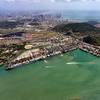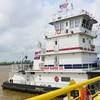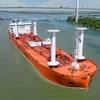Carnival Corp. Net Income Drops
Net income for the nine months ended August 31, 2000, was $771.7 million ($1.27 Diluted EPS) on revenues of $2.93 billion, compared to net income of $776.2 million ($1.26 Diluted EPS) on revenues of $2.71 billion for the same period in 1999.
The company's higher revenues during the third quarter of 2000 were primarily driven by an 11.3 percent increase in cruise capacity provided by Carnival Cruise Lines' 2,758-passenger Carnival Triumph, launched in July 1999; and Holland America Line's 1,440-passenger Volendam and Zaandam, introduced in November 1999 and May 2000, respectively.
Commenting on third quarter results, Carnival Corporation Chairman and CEO Micky Arison noted that operating results were largely in line with expectations given the continued pressure on cruise pricing, significantly higher fuel costs and the loss of five seven-day cruises due to the unscheduled drydock of Carnival Cruise Lines' Paradise. Despite these conditions, cruise operating earnings grew by $4.8 million in the third quarter compared to the same period in 1999. "Although we were not satisfied with third quarter financial results, our ships operated at a 112.4 percent occupancy rate, reflecting a 13.9 percent increase in passengers carried during the quarter," Arison said. He also pointed out that the company has carried close to 2 million passengers in the first nine months of 2000 compared to 1.75 million for the same period in 1999. "The record number of passengers carried will provide the various Carnival cruise brands with a growing base of satisfied guests to draw upon, which bodes well for future business," Arison explained.
Looking ahead, Arison said the fourth quarter of 2000 appears to be shaping up as expected with continued pressure on pricing, although comparisons with prior year net revenue yields may be somewhat better than third quarter comparisons.
Higher fuel costs are also expected to impact the fourth quarter.














